2017 All England Handicap Final
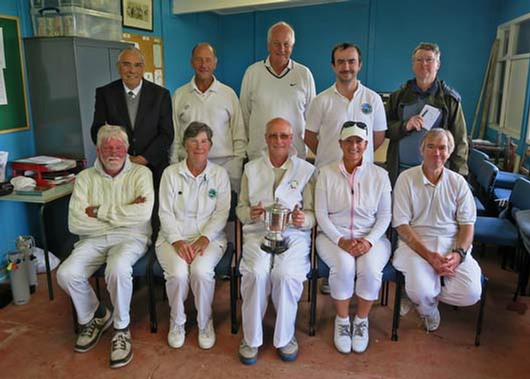
Standing l-
Seated l-
The winner of the 2017 All England Handicap Final was Phil Nuttall (16) from Bury Croquet Club, who won all five of his games. In second place was Libby Dixon (18) from Pendle and Craven, with three wins. Neal Bacon (5) from Nottingham and Jeremy Pardoe (8) from Broadwas were third and fourth, also with three wins.
This year’s competition began with 168 players playing preliminary heats at 30 clubs. Representatives from the heats (the number being proportional to the size of the entry) went through to the four area finals. The winners and runners-
This year’s final was held at Wrest Park for the first time since 1998 when there were 16 players and all six lawns were flooded for many hours. The club’s new lawns drain more quickly, which everyone was grateful for on Saturday afternoon when heavy rainfall caused localised flooding, but the lawns were playable within half an hour even though the rain persisted. Games were limited to three hours and played as full bisque, base 10, and the event was managed by George Collin, who was also the ROT.
|
|
Wins |
Net points |
Position |
|
Phil Nuttall (16) |
5 |
+ 71 |
1 |
|
Libby Dixon (18) |
3 |
+ 18 |
2 |
|
Neal Bacon (5) |
3 |
+ 10 |
3 |
|
Jeremy Pardoe (8) |
3 |
- |
4 |
|
Julie Sheahan (11) |
2 |
+ 25 |
5 |
|
Douglas Dykes (16) |
2 |
+ 19 |
6 |
|
Robert Upton (3½) |
1 |
- |
7 |
|
Adam Huby (7) |
1 |
- |
8 |
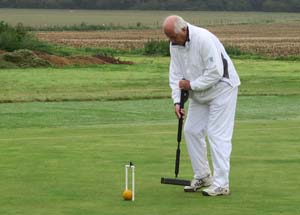
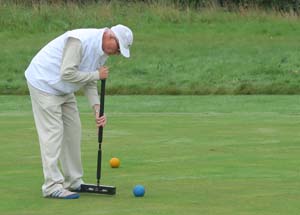
Phil Nuttall
Douglas Dykes
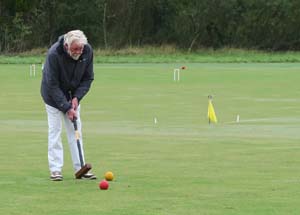
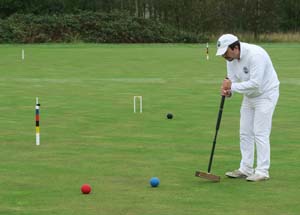
Jeremy Pardoe
Neal Bacon
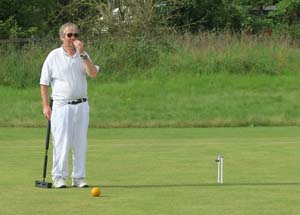
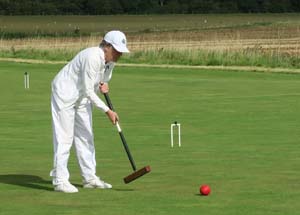
Julie Sheahan
Adam Huby
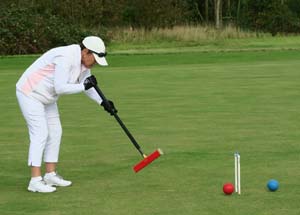
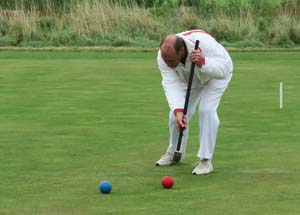
Libby Dixon
Robert Upton
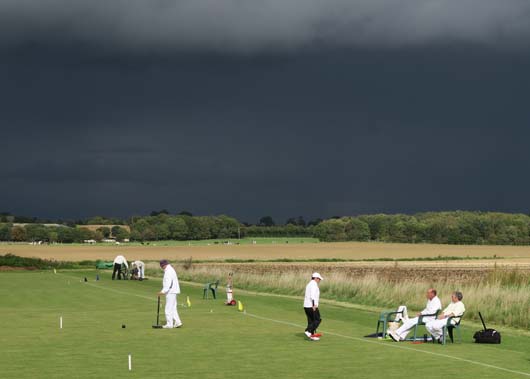
Before the flood
The first round saw +26 wins for Julie against Adam and Phil against Robert. Libby made a promising start against Neal but the bisques ran out, and Jeremy had a narrow win against Douglas. Saturday closed with Phil on three wins and Julie, Libby and Jeremy on two.
On Sunday morning Phil stretched his lead by beating Libby, and Jeremy beat Julie +2 on time. Douglas accounted for Adam and Robert suffered his fourth defeat, this time at the hands of Neal. The last round saw Phil complete a clean sweep by beating Douglas +5 on time, and Robert (the lowest handicap at 3½) finally broke his duck by beating Julie +3 in a tight finish.
What of the play? Well, we saw its infinite variety, as you might expect with such a wide range of handicaps and experience. Lots of good stuff -
Thanks are due to George Collin for managing. A five round Swiss with eight players can be a nightmare (see Gaunt & Wheeler on this), but Phil simplified his job considerably. Thanks too to Geoff Strutt and John Bevington for organising lunches and teas, Tim Brewer for pre-
The All England Handicap is the most democratic event in the calendar and deserves more support. Without more data one cannot judge its state of health, but the numbers have halved since 1998 when there were 357 entries. Would two more area finals draw in more clubs, with an American block final for the six winners? One for the Tournament Committee.
© Wrest Park Croquet Club
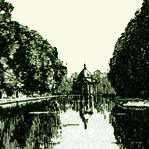
Club
Croquet
Wrest Park
